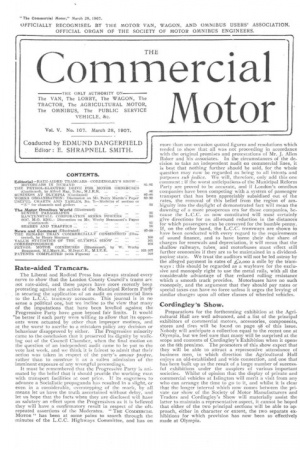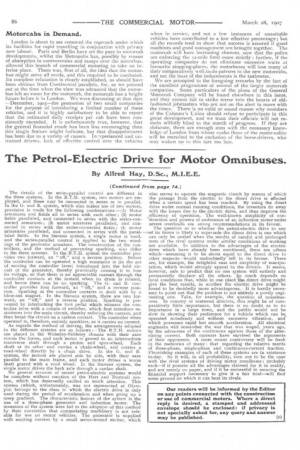Rate-aided Tramcars.
Page 1

Page 2

If you've noticed an error in this article please click here to report it so we can fix it.
The Liberal and Radical Press has always strained every nerve to show that. the London County Council's trams are not rate-aided, and these papers have more recently been protesting against the action of the Municipal Reform Party in securing the applicationof an audit on commercial lines to the L.C.C. tramway accounts. This journal is in no sense a political one;•but we incline to the view that many of the imputations that have been levelled against the Progressive Party have gone beyond fair limits. It would be better if each party were willing to allow that its opponents were actuated by other than improper motives, and at the worst to ascribe to a mistaken policy any decision or behaviour disapproved by either. The Progressive minority came to the conclusion that it preserved its dignity by walking out of the Council Chamber, when the final motion on the question of an independent audit came to be put to the vote last week, and we think it is fairest to admit that their action was taken in respect of the party's amour pro pre, rather than to construe it as a sullen admission of the imminent exposure of any wrongful proceedings.
It must be remembered that the Progressive Party is animated by the belief that it should provide the working man with transport facilities at cost price. If its eagerness to advance a Socialistic propaganda has resulted in a slight, or even in a considerable, overstepping of the mark, by all means let us have the truth ascertained without delay, and let us hope that the facts when they are disclosed will have as salutary an effect upon the Progressives as it is believed they will have a confirmatory result in respect of the oftrepeated assertions Of the Moderates. "THE COMMERCIAL MOTOR" has been at some pains to search through the animates of the L.C.C. Highways Committee, and has on
more than one occasion quoted figures and resolutions which tended to show that all was not proceeding in accordance with the original promises and protestations of Mr. J. Allen Baker and his associates. In the circumstances of the de to take an independent audit on commercial lines, it is best that nothing further should be said, for the whole question may now be regarded as being to all intents and purposes sub judice. We will, therefore, only add this one comment : if the worst anticipations of the Municipal Reform Party are proved to be accurate, and if London's omnibus companies have been competing with a system of passenger transport that has been appreciably subsidised out of the • rates, the removal of this belief from the region of am.biguity into the daylight of demonstrated fact will mean the dawning of a more prosperous era for those companies, because the L.C.C. as now constituted will most certainly give directions for an all-round reduction in the distances for which passengers can be conveyed for the humble penny. If, on the other hand, the L.C.C. tramways are shown to have been conducted with every regard to the requirements of sound finance, and to have borne their due share of charges for renewals and depreciation, it will mean that the shallow railways, tubes, and motorbuses must effect still further economies if they are to be maintained in a dividendpaving state. We trust the auditors will not be led astray by the alleged payment in rates of £2,000 a mile by the tramways : this should be regarded as a wayleave for the exclusive and monopoly right to use the metal rails, with all the considerable advantage of that reduced rolling resistance which a smooth track provides. Motorbuses have no such monopoly, and the argument that they should pay rates or special taxes can have no force unless it urges the levying of similar charges upon all other classes of wheeled vehicles.
Cordingley's Show.
Preparations for the forthcoming exhibition at the Agricultural Hall are well advanced, and a list of the principal exhibitors of commercial motors, accessories, components, stores and tires will be found on page 98 of this issue. Nobody will anticipate a collection equal to the recent one at Olympia, but we feel sure that many will be surprised at the scope and contents of Cordingley's Exhibition when it opens on the 6th proximo. The promoters of this show expect that they will be able to attract a representive attendance of business men, in which direction the Agricultural Hall enjoys an old-established and wide connection, and one that has been built up as the result of a large number of successful exhibitions under the auspices of various important societies. Whilst of opinion that the display of private and commercial vehicles at Islington will merit a visit from any who can arrange the time to go to it, and whilst it is clear that the longer interval which now comes between the pri. vate car show of the Society of Motor Manufacturers and Traders and Cordingley's Show will materially assist the latter to maintain a representative aspect, it cannot be hoped that either of the two principal sections will be able to approach, either in character or extent, the two separate exhibitions for which provision has now been so effectively made at Olympia.
Motoreabs in Demand.
London is about to see removed the reproach under which its facilities for rapid travelling in conjunction with privacy now labour. Paris and Berlin have set the pace in motorcab developments, whilst the Metropolis has, possibly by reason of absorption in controversies and essays over the motorbus, allowed this branch of commercial motoring to take an inferior place. There was, first of all, the idea that the motorbus might serve all needs, and this required to be combated. Its complete refutation is clearly established, as should have been obvious from Continental parallels, for, as we pointed out at the time when the view was advanced that the motorbus left no room for the motorcab, the motorcab has a bright future before it in London. We were discussing at that date —December, 'gas—the promotion of two small companies for the purpose of introducing a limited number of these vehicles, and it is highly satisfactory to be able to report that the .estimated daily receipts per cab have been consistently exceeded. It is unfortunately true, however, that the general financial result has been less encouraging than this single feature might indicate, but that disappointment has been due to a variety of causes. Incxperienced and untrained drivers, lack of effective control over the vehicles when in service, and not a few instances of unsuitable vehicles have contributed to a low effective percentage; but all the records tend to show that success is assured if good machines and good management are brought together. The motorcab will have increasing chances, now that the police are enforcing the 12-mile limit more strictly : further, if the operating companies do not eliminate excessive waits at favourite stopping-places, the motorbuses will lose many of their comparatively well-to-do patrons to the new motorcabs, and not the least of the inducements is the taximeter.
We are prompted to the foregoing remarks by the fact of the excellent programme of several of the larger motorcab companies. Some particulars of the plans of the General Motorcab Company will be found elsewhere in this issue, and they cannot fail to strike terror into the hearts of oldfashioned jobmasters who are not on the alert to move with the times. There is no valid or sound reason why members of the Cabmen's Union should refuse to participate in this great development, and we trust their officials will not remain wilfully blind to the march of progress. If they are obdurate, there are enough men with the necessary knowledge of London from whose ranks those of the motor-cabby will be recruited to the exclusion of the horse-drivers, who may waken up to this fact too late.
























